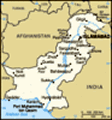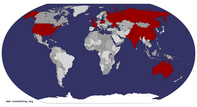Advertisement
Published: January 3rd 2008
Things are settling down in Pakistan, and life has been inching towards normality in the twin cities of Islamabad and Rawalpindi over the last few days. The 'miscreants', 'mischief-mongers' and 'anti-social elements', as the newspapers call them, have mainly been refraining from creating civil unrest. The shops and markets are open again, public transport has been re-instated, petrol is available, and the people have come out of their houses. The PPP flags are still flying high, the debates about the now postponed election and the cause of BB's death rage on, but life inevitably goes on.
I spend my days drifting, talking to random strangers, walking in parks, shopping, doing little excursions to nearby villages and shrines, and visiting families. Islamabad is an incredibly sociable city: I meet new people every day, and could easily spend every day at somebody's house, drinking chai and eating biscuits. For the past few days, I have been mostly doing just that. I visit Aurang Zeb's family again on Sunday afternoon and am introduced to half his neighbourhood; on another day, a taxi driver insists I come to his family home in Rawalpindi for dinner. For the first time since I started this trip,
I feel like I'm actually 'on holiday'. Despite, or maybe because of the recent events here, things have been very relaxed.
Apart from perusing the marriage ads in the local paper - which are invariably placed by the parents and demand that the match for their valued offspring 'must belong to a well-established family' or preferably be a 'doctor or civil servant' -, I amuse myself by reading a neat little book called 'The Ideal Sex Life', which I simply can't resist buying in a little bookshop in Jinnah Market, much to the amusement of the salesmen. This book, written by a certain Dr A.R. Sharma and printed in Rawalpindi, seems to be a bestseller over here, judging by the grand display it receives in the shop. It is a 'practical guidebook to Sex and Marriage concerned with the problems that affect every man and woman in our world today', and is full of classics such as, 'Why prostitutes never get pregnant?' (they do, apparently, 'especially the younger ones', and frequently abort illegally, and not only that, 'they become infected with gonorrhea'), and 'When my wife and I have intercourse, she says I reach my climax too quickly for
her. She says she has timed it to be five or ten minutes.' The doctor answers, 'If you carry on intercourse for five or ten minutes, you do it considerably longer than the average man. The average is probably in the vicinity of two minutes.' One lady asks, 'I would like to know if, after I am married, I should make love with my husband every night or will this take too much out of him? Can it make him sick even though he will have three balanced meals a day?' A real gem.
Islamabad is the kind of place I could stay in for months. Once you get used to the incessant staring you encounter - pairs of dark eyes follow you wherever you go and whatever you do - and infact, start to have fun with it, things are really fine. Every day is an adventure: I don't have to make any special plans, I just walk out of the door and see what happens. And invariably, something interesting occurs. I never thought I would like this country so much, as I had my reservations - and fears - about coming to a Muslim country. Undoubtedly, there
are many extremely serious problems - and dangers - in Pakistan at the moment, but it's easy to forget the positive elements in view of all this. Before I came here, many people in Europe warned me not to go, and I remember in particular the words of Herbert, a German traveller I met in Tibet, who said to me whilst shaking his head rather disdainfully, 'I wouldn't want to spend two days in that country - let alone two weeks! Why on earth are you going there?!' I am glad I disregarded these concerns and decided to visit anyway. I just can't say it enough: the generosity, kindness and hospitality of the Pakistani people make it all worthwhile.
On New Year's Eve, I go to the Indian Embassy to collect my passport. At the bus stop in the Diplomatic Enclave, I meet three men who are headed for the Indian Embassy as well. After we exchange the usual pleasantries, Shahid, one of them, tells me that he is an astrologer and healer who treats cancer patients with sound and crystals. My jaw drops. Really?! He is exactly the kind of person I've been wanting to meet over here.
With his moustache and smart suit, he looks like the archetypal Punjabi business man, but well, appearances can be deceptive. It turns out that he is from Lahore and he promptly invites me to stay with him and his family when I get there. While I wait for my passport, I meet Magalie, a French foreign aid worker, who invites me to celebrate New Year's Eve with her and a few other Medicine Sans Frontiers aid workers. I accept and we see the New Year in with pizzas, a few drinks and a great selection of 80's music, as well as strange French chansons with titles like 'C'est bon pour la morale' ('It's good for the mood'), which feels rather bizarre, considering where we are.
On New Year's Day, I visit nearby Saidpur, a formerly Hindu village still famous for its pottery. As I walk up the street, I meet on old man with a bedouin turban, white hair, and black kohl around his eyes. He looks like he comes straight out of '1001 nights'. He happens to be the village potter, and takes me to his workshop to show me his art - beautiful vessels, lamps, candleholders, toys,
even a huge clay train which he has modelled and painted. I buy a little ornament for my friend Naumana, and I meet his son, wife and little baby. Rahim, such is the potter's name, then takes me on a wonderful hike up a rugged mountain just behind the village. The old man, who must be at least seventy years old, is amazing: he climbs up the rocks steady-footed like a markhor, as I stumble on behind him. The hike is worth it: beneath a huge tree with massive roots by an enchanting waterfall, we have glorious views over the valley. There are baby goats and cows wandering around, and the silence is complete. As the old man perches over me on a big rock by the waterfall and lights a cigarette, looking like an oriental painting, I curse the fact that I haven't got my camera with me. So does he: he would like to have his photo taken. I return to Saidpur today with my camera and a box of Afghan biscuits for the potter to thank him for the hike.
Yesterday, I spend the day in Taxila, one of south Asia's richest archaeological sites. The city
of Takshasila (Sanskrit name) has been known ever since Alexander the Great invaded India in 326 BC, and was situated between the Indus and Jhelum Rivers beneath the Murree Hills. Taxila was known as a seat of great oriental cultures and learning, and what remains now are an impressive archaeological museum, and many excavated sites, mainly Buddhist, but also some older ones from the pre-Islamic Indus civilization. First I visit the museum, where I marvel in particular at the sight of voluptous fertility Goddesses holding vessels, bearing full moons on their heads, sitting astride horses, and a magnificent headless gilded stone sculpture of Aphrodite from the 1st Century AD. There are many other statues of Athena, Ganesha, and the Buddha. There is a particularly wonderful ritual tank on display: a square temple with vessels on the walls, a staircase, and the headless figure of a Goddess at the back by the altar. There is evidence of Goddess worship everywhere - somehow, I just didn't expect to find it here.
I continue to visit an abundance of archaeological excavations, including Sirkap - a walled city from the 2nd Century BCE, which includes some stupas and a small Buddhist Temple; Dharmarajika - a huge Buddhist stupa situated on a hill; Jaulian - which contains the bases of several 5th Century votive stupas and bas-relief Buddhas with vivid carvings, and Mohra Moradu. At the latter place I find a somewhat Pagan site, infact it reminds me of the Buryat sites I came across in Siberia: huge trees with offerings of cloth tied to them, and a little altar with incense and oil lamps in front. There is also a site for fire and food offerings. The caretaker lets me into the enclosure and allows me to make some offerings, and explains that this is a Sufi site, and that many women come to it to pray for children, a husband, and so on. It is much revered and frequented by local people, apparently. I am surprised, and delighted: again I didn't expect to find such an obviously 'Pagan' or animistic site of worship in an Islamic country.
Highlight of the day is Jandial Temple, the ruin of a classical Greek Temple, which feels very powerful and 'Goddessy' indeed. I am inspired to leave an offering of two oranges, which a little boy gave to Azar, my driver, and me earlier on. Azar and an old man sitting on the temple steps want to know what I'm doing. 'Offerings for Allah!', I laugh as I skip towards the altar, '
My Allah!'
Well, sadly, my time in Islamabad is coming to an end. My visa is about to run out, and I am leaving for Lahore tomorrow, by train. When I purchase my ticket at Rawalpindi Station's 'Lady's Queue', aided by a nice Pakistani couple who turn out to be Christian, I ask the clerk if the train will arrive after five hours, as stated. He looks wistfully at me, turns up his hands, looks towards the ceiling, and smiles: 'In-sha-Allah'. (God Willing). A collective laugh ripples through the queue behind me.
Advertisement
Tot: 0.105s; Tpl: 0.016s; cc: 11; qc: 28; dbt: 0.0572s; 1; m:domysql w:travelblog (10.17.0.13); sld: 2;
; mem: 1.1mb











MANSOOR
non-member comment
Taxila
It is a shame that Taxila is one of a few places in Pakistan that history of Pakistan can be found. Having visited many areas of Pakistan there are few places preserved the same way as Taxila. In a country with a vast, vibrant history it is a real pity.